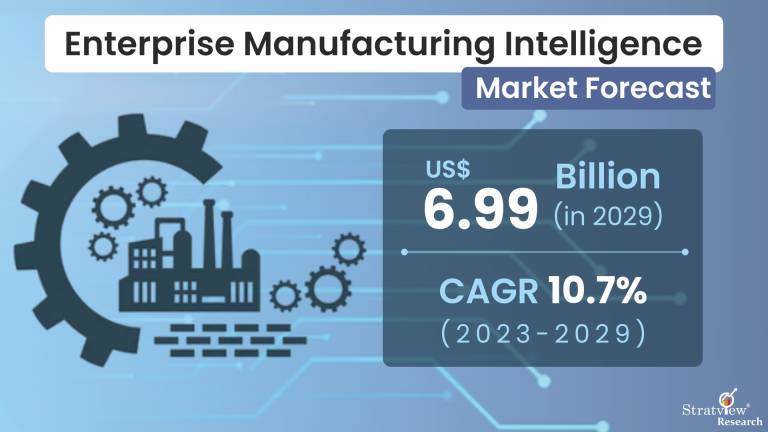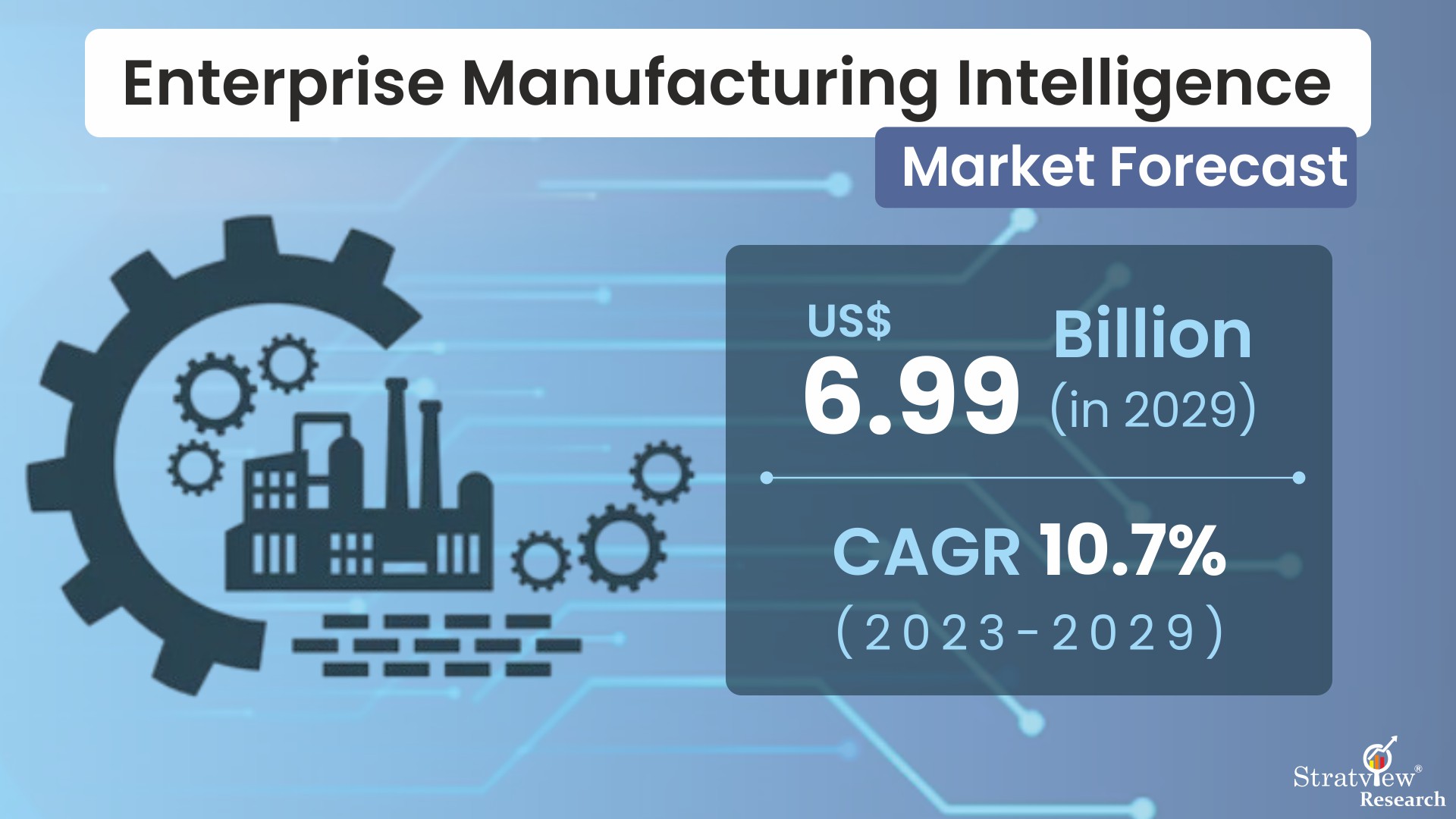Market Insights
The enterprise manufacturing intelligence market was estimated at USD 3.42 billion in 2022 and is likely to grow at a CAGR of 10.7% during 2023-2029 to reach USD 6.99 billion in 2029.

Want to know more about the market scope? Register Here
Market Dynamics
Introduction
Enterprise Manufacturing Intelligence (EMI) refers to the use of data analytics and business intelligence technologies in manufacturing operations to gain real-time insights into production processes and supply chain performance. EMI collects data from various sources, including manufacturing equipment, sensors, and supply chain systems, and aggregates this data to provide a unified view of manufacturing operations.
This enables manufacturers to identify inefficiencies, optimize processes, and improve product quality. EMI can also help to identify opportunities for cost reduction, minimize waste, and improve overall profitability. Some examples of EMI applications include predictive maintenance, quality control, and real-time inventory management. By leveraging EMI technologies, manufacturers can reduce costs, increase efficiency, and improve overall operational performance.
Market Drivers
The manufacturing industry is embracing Industry 4.0 by adopting digital technologies to improve and modernize their processes. The integration of various digital transformation technologies, including the Internet of Things (IoT), is increasingly common and offers significant benefits. Manufacturing companies are modernizing their supply chain by utilizing Big Data and GPS tracking to enable data-driven planning and address issues related to supply, demand, and logistics. These advancements provide a competitive advantage over competitors and enable companies to stay ahead in the market.
Additionally, the rise of big data is anticipated to have a significant impact on market development, as it can be widely applied in industries such as automotive, aerospace and defense, and others. Integrating Big Data with enterprise manufacturing intelligence software will enable companies to identify, analyze, and address issues and faults in their manufacturing units, ultimately increasing productivity.
Market Restraints
The Enterprise Manufacturing Intelligence market faces various restraints that could hinder its growth and development. Some of these restraints include high implementation costs, security concerns, lack of skilled workforce, integration issues, and resistance to change. The implementation of Enterprise Manufacturing Intelligence systems can be expensive, which could limit the adoption of the technology by small and medium-sized enterprises.
The use of Enterprise Manufacturing Intelligence systems could pose security threats to confidential data and information, which could lead to data breaches and loss of sensitive information.
The effective implementation and utilization of Enterprise Manufacturing Intelligence systems require specialized skills, which could be scarce in the market. The integration of Enterprise Manufacturing Intelligence systems with existing enterprise systems could be a challenge, leading to compatibility issues and data inconsistencies. Resistance to change among employees could be a significant barrier to the successful implementation and adoption of Enterprise Manufacturing Intelligence systems.
Segment Analysis
By End-User Industry Type
The automotive industry is experiencing a swift evolution in manufacturing technologies. Original equipment manufacturers in this sector face multiple challenges in designing, manufacturing, and upgrading conventional powertrain models to synchronize their processes with advanced technologies that enhance consumer satisfaction and experiences.
The rapidly growing adoption of automation in the automotive manufacturing process, coupled with the emergence of digitization and AI technology, are among the primary drivers of demand for manufacturing intelligence solutions in this industry.
The automotive industry has been at the forefront of adopting advanced manufacturing technology, from the progressive assembly line to lean manufacturing processes. As the industry faces reduced design-to-production times, automotive manufacturers and suppliers worldwide are expected to drive demand for these solutions.
Additionally, the rapidly shifting market conditions, increasing competition, cost pressure, and volatility are changing the industry landscape. With the emergence of autonomous driving vehicles and changing ownership and usage models, the automotive industry is on the cusp of a revolution.
Regional Insights
Due to the utilization of modern manufacturing facilities that rely on new technologies and innovations to produce high-quality products at lower costs, the North American region is expected to hold a significant market share. Additionally, the region's early adoption of trending technologies such as the IoT, Big Data, DevOps, and Mobility has led to the integration of multiple technologies, such as IoT and robotics, by manufacturers to streamline their processes and leverage the insights generated by data analytics.
The implementation of fast and secure 5G connectivity is expected to provide agile operations and flexible production in the manufacturing industry. This technology is likely to enable various automated processes, such as automated warehouses, assembly, logistics, packing, and product handling, as well as the utilization of autonomous cars that can be optimized with data usage.
Additionally, the automotive sector has been a significant source of revenue in the North American region's manufacturing industry. Canada has experienced steady growth in its economy over the past few years, particularly in the automotive sector in Ontario, where mixed technologies such as AI, machine learning (ML), and wearable intelligent robots are assisting human workers in the manufacturing process.
The EMI market in the Asia Pacific region is experiencing various trends that are shaping its growth and development. Some of these trends include growing demand for real-time data, adoption of Industry 4.0 technologies, focus on operational efficiency, increasing use of cloud-based solutions, and government initiatives.
The increasing need for real-time data to optimize production processes and enhance decision-making is driving the demand for EMI solutions in the region. The adoption of Industry 4.0 technologies such as the IoT, AI, and ML is driving the growth of EMI solutions in the region.
Manufacturers in the Asia Pacific region are placing greater emphasis on improving operational efficiency, reducing costs, and enhancing productivity, which is driving the adoption of EMI solutions. The adoption of cloud-based EMI solutions is increasing in the Asia Pacific region due to their scalability, flexibility, and cost-effectiveness. Government initiatives to promote digitalization and Industry 4.0 in countries such as China, Japan, and South Korea are driving the growth of the EMI market in the region.

Know the high-growth countries in this report. Register Here
Key Players
The major players operating in the market are:
- Honeywell International Inc.
- ABB Ltd.
- Schneider Electric SE
- Rockwell Automation, Inc.
- Siemens AG
- Aspen Technology, Inc.
- Dassault Systemes Sa
- Emerson Electric Co.
- General Electric Co.
- Yokogawa Electric Corporation
- SAP SE
Note: The above list does not necessarily include all the top players in the market.
Are you the leading player in this market? We would love to include your name. Write to us at sales@stratviewresearch.com
Research Methodology
This strategic assessment report, from Stratview Research, provides a comprehensive analysis that reflects today’s enterprise manufacturing intelligence market realities and future market possibilities for the forecast period. The report segments and analyzes the market in the most detailed manner to provide a panoramic view of the market. The vital data/information provided in the report can play a crucial role for market participants as well as investors in the identification of the low-hanging fruits available in the market as well as to formulate growth strategies to expedite their growth process.
This report offers high-quality insights and is the outcome of a detailed research methodology comprising extensive secondary research, rigorous primary interviews with industry stakeholders, and validation and triangulation with Stratview Research’s internal database and statistical tools. More than 1,000 authenticated secondary sources, such as company annual reports, fact books, press releases, journals, investor presentations, white papers, patents, and articles, have been leveraged to gather the data. We conducted more than 15 detailed primary interviews with market players across the value chain in all four regions and industry experts to obtain both qualitative and quantitative insights.
Report Features
This report provides market intelligence in the most comprehensive way. The report structure has been kept such that it offers maximum business value. It provides critical insights into market dynamics and will enable strategic decision-making for existing market players as well as those willing to enter the market. The following are the key features of the report:
- Market structure: Overview, industry life cycle analysis, supply chain analysis.
- Market environment analysis: Growth drivers and constraints, Porter’s five forces analysis, SWOT analysis.
- Market trend and forecast analysis.
- Market segment trend and forecast.
- Competitive landscape and dynamics: Market share, Service portfolio, New Product Launches, etc.
- COVID-19 impact and its recovery curve
- Attractive market segments and associated growth opportunities.
- Emerging trends.
- Strategic growth opportunities for the existing and new players.
- Key success factors
Market Segmentation
This report studies the market, covering a period of 12 years of trends and forecasts. The report provides detailed insights into the market dynamics to enable informed business decision-making and growth strategy formulation based on the opportunities present in the market.
The enterprise manufacturing intelligence market is segmented into the following categories:
By Deployment Type
- Embedded EMI Solutions
- Sandalone EMI Solutions
By Application Type
- Data Integration
- Data Contextualization
- Analytics and Analysis
- Visualization
By Offering Type
By End-User Industry Type
- Process Industries (Chemical, Energy and Power, Food and Beverages, Oil and Gas, Pharmaceutical)
- Discrete Industries (Aerospace and Defense, Automotive, Medical Devices, Semiconductor and Electronics)
By Region
- North America (Country Analysis: the USA, Canada, and Mexico)
- Europe (Country Analysis: Germany, France, the UK, Russia, Spain, and Rest of Europe)
- Asia-Pacific (Country Analysis: China, Japan, India, South Korea, and Rest of Asia-Pacific)
- Rest of the World (Sub-Region Analysis: Latin America, the Middle East, and Others)
Customization Options
With this detailed report, Stratview Research offers one of the following free customization options to our respectable clients:
Company Profiling
- Detailed profiling of additional market players (up to three players)
- SWOT analysis of key players (up to three players)
Competitive Benchmarking
- Benchmarking of key players on the following parameters: product portfolio, geographical reach, regional presence, and strategic alliances.
Custom Research: Stratview research offers custom research services across the sectors. In case of any custom research requirement related to market assessment, competitive benchmarking, sourcing and procurement, target screening, and others, please send your inquiry to sales@Stratviewresearch.com.
Recent Developments
- In February 2023, Mitsubishi Electric launched a new AI solution that aspires to address skilled labour shortages on manufacturing lines.
- In October 2022, Sight Machine, a developer of the data foundation for manufacturing, launched Sight Machine Blueprint, a tool developed in collaboration with Microsoft and NVIDIA that provides manufacturers with high-speed, automated data labeling, mapping data tags to plant assets and the context they require to interpret their plant data.
- In October 2022, Aspen Technology acquired inmation Software GmbH, a leading vendor of industrial real-time information management solutions.
- In June 2022, Siemens and NVIDIA partnered to enable industrial metaverse. The partnership empowers the manufacturing industry with immersive experiences across the lifecycle from design through operation.
- In May 2022, SAP and HCL Technologies partnered to accelerate Industry 4.0 driven smart IoT technologies.

